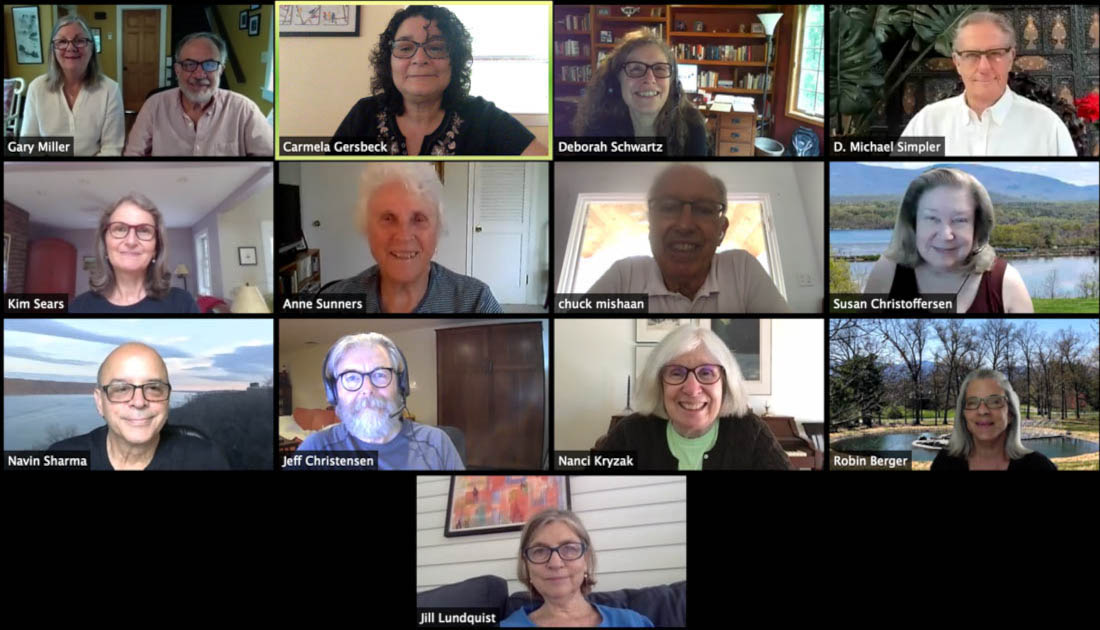Introduction
In March 2020, as I was preparing for spring classes at Bard, I received the disappointing news that the semester was canceled. I had really been looking forward to being back on campus and meeting up with some of the nice people I had met during my first semester. Because I had become active on the Communications and Technology Committees, I received a call asking if there was any chance that LLI could set up online courses. Since I had never heard of Zoom until a week before, I suggested that I be given a week to explore the technology and provide my thoughts. I then spent a full week watching Zoom videos several hours a day! A week later, I told the leadership team that I thought we could do it, but it would require a lot of people, time, and effort. Luckily, Susan Christoffersen agreed to co-manage the newly created Online Team to support this effort. Why did we do this, and how did we get people to support this effort? Well, read on and you will see why!


Teamwork
The first thing the team did was call people that we thought would be interested in learning this new technology. Luckily, we made great choices. My first two calls were to Jeff Christensen and Robin Berger, who were excited about the opportunity to learn a new technology. Others who quickly joined the team were Bill Tuel, Michael Simpler, and Gary Miller, who provided a lot of information from the presenter’s point of view. Council members who joined the Online team included Nanci Kryzak, Jill Lundquist, Cathy Reinis, and of course, Deborah Schwartz, our head of Technology and Admin Infrastructure.
This team willingly created personal Zoom accounts and did a deep dive into the intricacies of Zoom and how it could be used most effectively at Bard. Jeff coined the term “session manager” and took on learning how to use the webinar features since our first official Bard Zoom meeting was the Annual Meeting in May. Once the Annual Meeting was under our belts, we took on the challenge of SummerFest on Zoom, which went extremely well. Next up, fall semester 2021—and we needed to recruit and train a cadre of session managers since there were a lot of classes.
What's in it for Them?
I was surprised at the number of people who volunteered to be our fall session managers. The training was time-consuming (about three to four hours). People not only attended meetings and rehearsals, but also seemed to enjoy them! I went back and asked a few of our early session managers why they volunteered and what they liked about it. Here are some of their responses:
Dale Ziegenfelder said, “It was a way to contribute without spending a whole lot of extra time, since I’m taking the course anyway. It seems I have more interests than I have time for.” Robin Berger joined “…because I felt that I could contribute to LLI and utilize some skills that I was confident that I had.”
Susan Simon is both a new LLI member and a new session manager. When asked why she decided to jump right in, she said, “I enjoy being a part of the team that interacts with the presenters and participants. Session management enhanced my technical and Zoom skills, and I look forward to continuing to be a Bard LLI ‘zeejay.’” Kim Sears is also one of the newer members who joined the session manager team. As Kim said, “After experiencing our LLI’s meteoric transition to Zoom format in the fall and for WinterFest, I was inspired to volunteer as a session manager. My skill level was probably about average but I was sure that with the promised training I would be able to hold my own and be of use.”


What Presenters Have to Say
We were fortunate to have Gary Miller and Michael Simpler as members of the Online Team. They not only participated in the session manager training, but also proved to be skilled Zoom presenters. “It serves a multitude of needs,” says presenter Gary Miller. “My class usually consists of a hundred slides and video clips, and potential problems are eliminated ahead of time due to good communications with the session manager, either by chat or text. Or, even more critical, during the actual presentation. The best part is the audience is unaware.”
Michael Simpler, who has presented 22 different courses at four regional LLIs, and has presented three online classes during the pandemic, said, “My experience is that in all circumstances a session manager is essential to a successful class. Experience has shown that session managers really enjoy this interaction with the presenter and the class members, which makes for a productive and rewarding experience for everyone.”
Some of the Challenges
The session manager wears more than one hat. Before the start of class, they are in contact with presenters and producers, fine-tuning PowerPoint or Keynote slide shows, estimating timing and pace, and in general serving as a test audience. In addition, they must establish trust with the presenter. As Michael SImpler says, “even if a presenter is proficient with Zoom, it is still very important to have an able session manager. First, the preparation of the Zoom settings and email notifications can be involved. Next, having the session manager undertake the hosting functions necessary for the LLI organization and clarifying operational procedures like Q&A and the many options for viewing frees the presenter from the details that are not relevant to the presentation.”
Finding the time to schedule rehearsals can sometimes be a challenge. The session managers take a great deal of pride in what they do and like to make sure their meetings run smoothly. To this end, they meet with presenters, give them feedback on their lighting, and offer suggestions on their presentation style when asked. As Dale Ziegenfelder pointed out, “the downside is that sometimes I’m distracted from the content of the course.”
There are often technology challenges: WiFi can go out at any time, power outages occur, presentations can get lost. The session managers make sure that there are backups for everything!


What are the Rewards?
As Robin Berger said, “Being a session manager gives you a great deal of insight into what it means to present a class online. As a session manager you get to have a relationship with the presenter as well as the producer of the class. I will continue to volunteer to be a session manager because I feel like I can contribute to the quality of the kinds of courses that LLI provides.” Several session managers and presenters have mentioned the bond that is created from working together. As Kim Sears said, “The bonus advantages were getting to know the members of the training team better, participating in pre-course meetings with presenters, and the thrill of learning something new (the whole reason I joined LLI in the first place!).”
Speaking for myself, I have thoroughly enjoyed being a session manager, honing my skills, and learning what it takes to present an online course. It truly is a labor of love!




You must be logged in to post a comment.